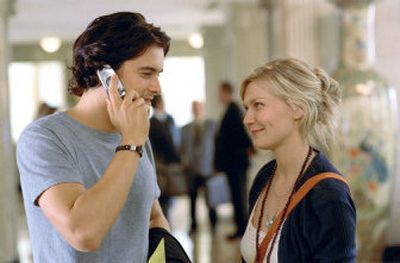Keeping it personal

As a filmmaker, Cameron Crowe is the equivalent of the guy who bellies up at a local watering hole and proceeds to share moments from his life with you – only his stories are usually more thought-provoking and enjoyable.
This is the guy who turned the story of a once-cynical sports agent in “Jerry Maguire” into a tour de force for Tom Cruise. It’s also the man who took his personal remembrances of life on the road as a teenage rock journalist and gave us a modern classic coming-of-age story, “Almost Famous.”
Ever since breaking on the scene with his realistic look at high school in the early 1980s with his first script, “Fast Times at Ridgemont High,” Crowe hasn’t been able to resist sharing little nuggets of himself.
His latest, “Elizabethtown,” which opens today, is more of the same. The film follows Drew Baylor (Orlando Bloom) as he goes to his father’s small Kentucky hometown to claim his body.
The movie is a tribute to Crowe’s late father, James, who grew up in Stanton, Ky.
“This one sort of chose me, and I thought that after ‘Almost Famous’ that that probably wasn’t going to be
a road that I was going to go down again soon,” Crowe says.
“But I think that after ‘Vanilla Sky,’ I knew that I wanted to write something more personal, or at least coming from me. I had another project going at the time and then this one arrived like a plane that needed to land quickly.”
The story of Drew, an athletic-shoe designer whose career suddenly runs into a dead end, and who has been a part of his father’s life only in spirit in recent years, explores the father-son relationship in a unique way. But Crowe wanted it to be more than that.
“It’s about cherishing life, hopefully in a non-soapbox-type way,” he says. “I just love doing movies packed with characters that you don’t forget immediately. And then from there the story started to come as a little bit of a tribute to my dad and a little bit of a way to tell a story that would begin with an ending and end with this beginning.”
Because he chose to honor his father’s memory, it was important to Crowe to remain true to his Kentucky roots. He avoided broad Southern stereotypes and encouraged the many regional actors in the film to use their normal voices instead of an exaggerated drawl.
“If you traffic in stereotypes, you’re on the wrong movie,” he says. “If you’re trying to put people in clothes they wouldn’t naturally wear, you’re in the wrong movie.
“(Authenticity) was the real desire because at the studio they will tell you that you don’t have to go all the way to Kentucky. They will give you a list of places nearby that look like Kentucky.
“That’s what they’ll say, but they don’t look like Kentucky and they aren’t Kentucky, and there’s nothing like the people from the region. And the whole idea was always to tell a story that didn’t originate in L.A. or New York. I think that hundreds of years from now they may look back at movies made during this time and wonder, ‘Did anyone live in between these cities?’ “
There’s no telling how those cities will receive “Elizabethtown,” but the movie was engulfed in a maelstrom at the recent Toronto International Film Festival. Critics proved unkind toward what Crowe called his work-in-progress version of the movie. He has reportedly cut more than 20 minutes since.
“I knew that the movie needed to be a little shorter, but (general audiences) in Venice and Toronto, they all loved the movie and wanted it at that length,” he said.
“I told everyone that I thought I was going to learn something from seeing the movie with three audiences of people and knowing that the best way to cut a comedy, to finish cutting a comedy is to see its rhythms and how it’s working with audiences.”
Crowe said he warned everyone what they were seeing was not a finished project, but in the world of movies, that’s code for “there are problems.”
“Yeah, I knew that going in and now it’s the right length … but this was the journey of this movie and I’ve had good reviews and I’ve had bad reviews,” he says. “I don’t discount the bad ones any more than I happily accept the good ones. It’s part of the ride.”
However, he adds: “Would I do it differently the next time? Probably.”
Another signature of Crowe’s filmmaking is choosing songs for his soundtracks that resonate with audiences.
Scenes from his films are indelibly linked with certain songs: in “Jerry Maguire,” it’s the crooning of Bruce Springsteen on “Secret Garden”; in “Almost Famous,” it’s the fictional band Stillwater, its roadies and groupies singing Elton John’s “Tiny Dancer” on a tour bus.
Crowe, who’s married to Heart guitarist Nancy Wilson, attributes the ability to know which songs will and won’t work to those years as a music journalist, when he profiled the likes of Led Zeppelin, David Bowie and other rock luminaries.
In “Elizabethtown,” for many it will likely be hearing the U2 anthem “(Pride) In the Name of Love” as Drew visits the hotel where Dr. Martin Luther King was assassinated.
“It’s the best. It’s the best,” Crowe says of choosing the right songs. “It’s picking the records that you love and inspire you and hopefully you earn the right to use them.
“Not every great record wants your movie,” he adds, “because most great records are a better movie already in your mind.”